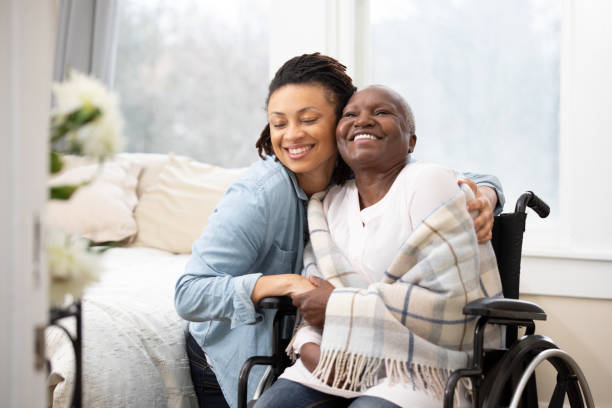
For seniors who have injuries or health problems that make it easy for them to fall; moving around the home safely can be challenging for them.
A number of health problems can increase their risk of falling. Such health problems include:
-
Poor eyesight
-
Unsteady gait
-
Weakness in the legs
-
Pain in the legs or feet
-
Side effects of medicines
-
Confusion due to Dementia
For people with these conditions, some common hazards in the home might more likely result in falls. To avoid such falls, there are certain extra safety precautions their families and caregivers should put in place; to even make the home a lot safer for them.
It is also noteworthy for children of aging parents or their caregivers that preventing falls for their loved ones can help them live a more independent life. Hence, a senior’s home must be one that provides comfort, familiarity, security and feelings of continued independence.
Here is a guide on how to make the home safer for your loved one:
Remove all hazards
Ensure that everything that can pose danger to your loved one should not be left around them or in their way. Inspect the home and surroundings for any likely hazardous materials such as broken chairs, broken handrails, uneven step, loose wires, unsecured throw rug or carpets and broken floor board or tile.
Icy, wet, or slippery surfaces cause a slip and fall. They should be promptly attended to avoid falls. Your loved one is also susceptible to falls in the bathroom. Grab bars should be installed in the tub or shower and in the toilet. Ensure that they are installed where they can be used easily.
Arrange furniture to allow adequate space or discard old furniture
Ensure to get the furniture in the home arranged in a way to create a more open and comfortable environment for your loved one; or by doing away with old furniture, if it’s likely to cause obstruction to mobility in the home. Creating a more open or spacious environment for them will make moving around in the home a lot easier especially if your loved one is still walking rather than using a wheelchair or walker. Also, in the latter case, doorways should be open enough to allow for access. Consider any tight corners before or after a doorway. These may restrict access and make mobility impossible. You should also avoid stretching extension cords across the floor.
Assess the bedroom.
If some extra precautions are not considered, a senior may be susceptible to several potential risks right in the bedroom.
Children of aged parents or seniors’ caregivers should do the following to make the bedroom safe for their loved ones:
-Ensure to replace a sagging and softer mattress with a firmer one. This will be far more comfortable, provide more support, to avoid your loved one getting trapped in it while resting.
-A grab bar that extends between the floor and ceiling should be fitted by the bedside in the bedroom. Your loved one will be able to hold on to it when getting in or out of bed.
Assess lighting
Most seniors are prone to visual impairment due to aging; thereby making their eyes not to work well as they once did. They tend to misjudge things especially when a room is not well lit up. Their home should be well-lit to prevent falls. You should replace any burnt out lightbulbs and install new light fixtures in dimly lit areas in the home. You can as well install a motion detection light inside and outside the home so the lights will turn on and off automatically.
Keep emergency numbers handy
Make it easy for your loved one to call for help by posting a note in large enough print; (that can be easily read while in hurry or frightened) by every phone and on the back of their cell phone. You can also help to set up emergency numbers on their phone so that they’re easily available for them if needed. Such numbers should include contacts such as family members, friends, healthcare providers, professional caregiving services, and poison control.
Protect against fire
To guarantee fire safety in senior homes, the following safety tips, should be considered:
-Make sure to replace any frayed or damaged cords and limit the number of cords plugged into power strips.
-Change the batteries in smoke and carbon monoxide detectors regularly twice a year
-Do not leave burning candles unattended to avoid fire outbreak.
-Install a smoke detector and replace the battery twice a year.
-Encourage your loved one to call for help immediately in a case of fire outbreak.
-Remind seniors to stay low when exiting the home in a fire. This reduces the chance of smoke inhalation. Coach seniors on how to “stop, drop, and roll” if their clothes ignite.
-Make sure heaters are at least 3 feet away from anything that can burn, such as curtains, bedding, or furniture. Advise your loved one to turn off the space heaters before going to bed or leaving the house.
Prevent poisoning
To prevent poisoning, advise against heating the home with stove, oven or grill as these can result in carbon monoxide poisoning. For extra safety precautions, ensure there is a functioning carbon monoxide detector near all bedrooms in the home. You should also encourage your loved one to practice medication safety by having the medicine labels printed largely, taking the medications in a well-lit room and storing and disposing of them properly and safely.
CONCLUSION
Safety precautions in the homes of seniors should be of great importance as these help to reduce the risks of falls and injury. These usually have immeasurable emotional effects on both seniors and their loved ones. Nevertheless, it should be rightly noted that every senior is entitled to enjoy safety, comfort, care and support. Consequently, the concerns of care providers of an aging family member should be how to protect their elderly loved ones from dangers, falls or fall related injuries.

